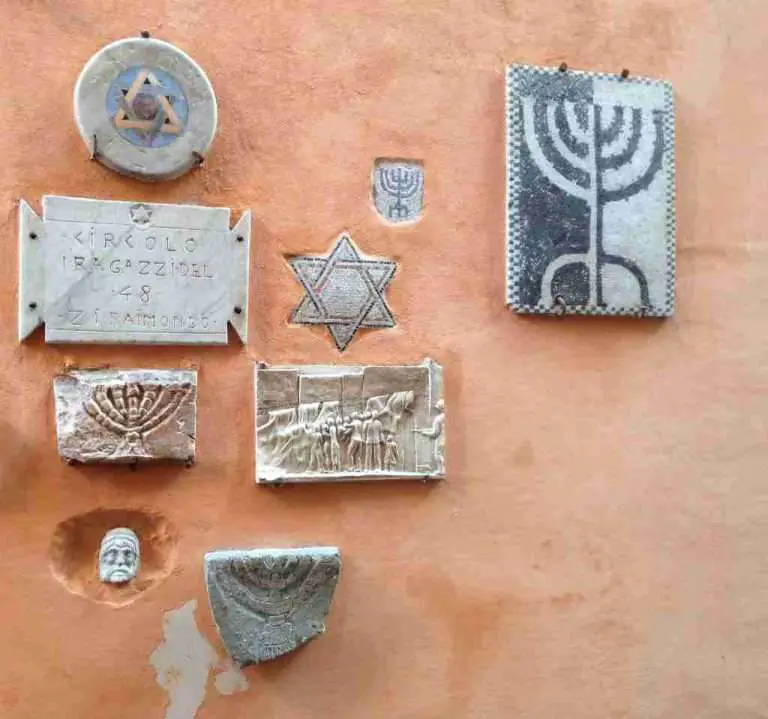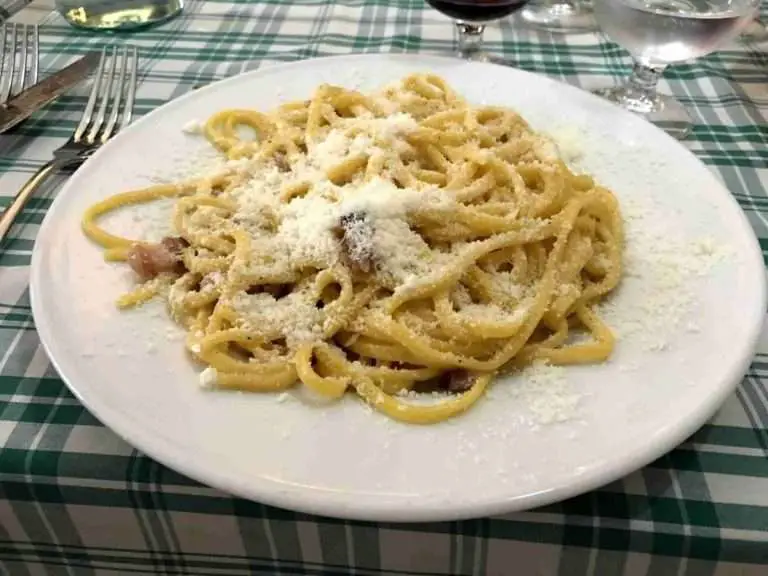
Going to see a soccer game in Italy is an exciting way to get to know the country and its culture. The roar of the crowd. The gorgeous green pitch. The chanting and singing—tutto in Italiano. Attending a football match lets you go beyond the typical itinerary of monuments and museums and just simply hang out with Italians in an authentic, passionate, and familial environment.
If you’ve ever attended any kind of sporting match inside a stadium, you know there’s nothing like ascending those stairs up to the point where the arena and the crowd come into view. Being in the stands when your team scores is also exhilarating, as everyone joins together in a call-and-response with the stadium announcer to call out the goal scorer’s name.
Attending a football match in Italy can seem like a daunting endeavor, especially if you don’t speak Italian. But it’s worth a little bit of hassle, in my experience, to make it part of your travel itinerary, especially if you have a calcio-loving friend or family member.
Over the years, many readers have asked for my advice about seeing a soccer match in Italy. So here is my primer.
Serie A
Serie A is the premier soccer league in Italy and the one that Italians follow most closely.
Serie A consists of 20 teams and each team plays all of the others twice throughout the season, once at home and once at the other team’s stadium. The season typically runs from August/September until the end of May/beginning of June, with several weeks off here and there for international breaks (e.g., Euro Cup and World Cup qualifiers). So that means that there are about 10 months out of each year when you can catch a Serie A game.
For Serie A news, see Gazzetta dello Sport (Italian), ESPN, and IFTV on Instagram.
For scheduling and other information, check for news on the Serie A website or on individual team websites, linked below.
Serie A Teams | 2024/2025 Season
- AC Milan
- Atalanta
- Bologna
- Cagliari
- Como
- Empoli
- Fiorentina
- Genoa
- Inter Milan
- Juventus
- Lazio
- Lecce
- Monza
- Napoli
- Parma
- Roma
- Torino
- Udinese
- Venezia
- Verona

Which Serie A team should you see?
Trying to figure out which team to see can be a challenge due to ticket availability and your travel itinerary.
Visiting Florence? Consider a Fiorentina game. Another team in Tuscany is Empoli.
Going to Naples? See Napoli.
Rome has two options, as do many larger cities—Milan and Inter; Torino and Juventus. Basically, I recommend figuring out your main objective to your travels, then decide. Considering that tickets aren’t usually released to the general public until about two weeks to a month out, it can be challenging to base your itinerary around a Serie A match. Be flexible.
Champions League and Europa League Matches
It is also possible to see Champions League and Europa League games in Italy.
Typically, The top four Serie A teams of the previous season compete in the Champions League against top finishers from other European premier leagues.
The Europa League is secondary to the Champions League and is made up of the fifth- and sixth-place Serie A finishers from the previous season plus any teams that don’t make it out of the group stage of the Champions League.
Tickets for Champions League matches and Europa League matches are typically more expensive and harder to come by than regular season Serie A tickets.
Those who have a fan loyalty card for their favorite Italian team (usually available for purchase from Ticketone or VivaTicket) get first dibs on tickets for Champions League and Europa League matches. You will also see tickets for these matches available on secondary ticket sites like ViaGoGo.
Serie B , Serie C, and Serie D
Most of the time when people ask me about soccer games in Italy, they are asking me about Serie A games. But there are also the lower leagues.
Serie B, C, and D are a tiered farm system of home-grown football talent that feeds into the big teams of Serie A and beyond Italy’s borders to leagues around the world.
Lega B
Lega B, also known as Serie B, is Italy’s secondary league. It has a season that runs about the same length as that of Serie A. The clubs of Lega B compete for a chance to be promoted to Serie A.
The top three teams of Serie B, which are determined through a final playoff round, get promoted each year to Serie A. At the same time, the bottom three Serie A teams get relegated to Serie B.
Meanwhile, the bottom three teams of Serie B get sent down to Serie C, and so on. I’ve flirted with Serie B fandom over the years and love the fact that it feels like back-to-basics, in-the-trenches, no-flash football. You can find tickets for many Serie B matches online, either from the club websites or from VivaTicket, ViaGoGo, or StubHub.
Serie C and Serie D
If you really like no-flash football, then there are the Serie C and Serie D leagues, which are usually contested by teams in much smaller Italian towns. The Serie C, also known as Lega Pro, is split into three groups (Girone A, Girone B, Girone C) of 20 teams each. Serie D, the Lega Nazionale Dilettanti, fields 166 teams split among nine groups.
Seriously, there’s a lot of soccer being played in Italy. If you are interested in seeing a Serie B, Serie C, or Serie D match, it’s best to check the individual teams’ websites for tickets. For most lower-tier teams, you can get a ticket on the day of the match. You may also find tickets for re-sell on ViaGoGo or VivaTicket.
Other Tournaments and Friendlies
Coppa Italia
Organized by Serie A, the Coppa Italia involves 44 teams from Italy’s top three leagues—all 20 from Serie A; all 20 from Serie B; and the top 4 squads from Serie C (aka Lega Pro).
It is a round-robin, knockout tournament wherein the lowest-ranked teams play in the first phase. The top 8 Serie A squads (based on the standings from the previous year) only enter the competition starting with the round of 16 in the second phase. This format heavily favors the big teams, but it does offer a chance for some “Cinderella” narratives.
The Coppa Italia begins in August (typically around the same time as the Serie A) and matches are played throughout the year, usually on weeknights. The final match is played in May at Rome’s Stadio Olimpico. You can find Coppa Italia tickets on participating teams’ websites or on sites like ViaGoGo.
Supercoppa Italiana
The Supercoppa Italiana is a single match that pits the Serie A winner and the Coppa Italia champion from the previous season. If a team wins both the Serie A and Coppa Italia during the previous season, then the Supercoppa match is played between the Coppa Italia winner and runner-up—essentially a rematch of the previous year’s Coppa Italia final.
The Supercoppa is usually played in winter. In recent years has often been played outside of Italy as a way to market Serie A. So that competition is not really relevant to those of us who want to see an Italian league soccer match in Italy.
Friendlies/Amichevoli
Finally, there are friendlies – amichevoli in Italian. You can learn more about what friendlies will be played during the year by looking at the website of the Italian team you are interested in seeing.
Friendlies are usually played during the break (e.g., in July and early August). I’ve seen two friendlies in Rome, with AS Roma as the host team. Both matches were festive and, er, friendly.
Primavera League
Wait, did I say finally? I didn’t even mention the Primavera League. Named after the Italian word for spring, the Campionato Primavera is a tournament for the youth squads (under-19) of Serie A (and some Serie B) teams. Most Serie A teams will have information about Primavera squads and matches on their websites.
The Italian National Team – Gli Azzurri and Le Azzurre
The Italian National Team (Nazionale di Calcio dell’Italiana) is affectionately known as Gli Azzurri (the Azures) after the blue jerseys they typically wear during competition.
You may be lucky to visit Italy during a time when the Nazionale is playing, either for a qualifier or tournament match for the World Cup or Euro Cup or as an exhibition or friendly match.
You can purchase tickets for Italian National team matches through Italian ticketing sites Vivaticket and Ticketone, through secondary ticket-selling sites (e.g., StubHub or ViaGoGo), or from the FIGC, the Italian national football governing body. This includes tickets for the men’s team and the women’s national team (Le Azzurre); U-16, U-17, and U-18 squads, and the national futsal team.
UEFA Euro Cup
The next UEFA European Championship—”the Euros”—will take place from June 09-July 09, 2028, in the UK and Ireland.
FIFA World Cup
The 2026 World Cup will be hosted by Canada, the U.S., and Mexico.
How to Get Tickets to a Soccer Match in Italy
Should I purchase my tickets before I go?
If you want to see a soccer game while you are traveling in Italy, it is best to purchase your tickets online before you go. Go directly to the website of the team you want to see to view their game schedule or view the Serie A schedule and check it against your travel itinerary. Note that the team listed first is the home team.
In my experience, it is much easier and often cheaper to purchase tickets directly from the club as they have more control over their tickets. But not all Serie A teams make their tickets available for purchase on their website. In this case, you will need to buy your ticket at a physical location or online from a secondary seller.
For single-game tickets, check a ticket resale site like ViaGoGo, Ticombo, or StubHub. Meanwhile, TicketOne and VivaTicket, both of which are authorized online ticketing sites for Serie A, sell season ticket packages and individual tickets for several teams.
Note that most clubs do not release tickets for purchase until about one month to two weeks prior to each match, which can be a pain if you are eager to finalize your itinerary months in advance. This is where secondary sellers like ViaGoGo or StubHub come in. The tickets listed for resale on those sites are ones that have been purchased ahead of time, usually by long-time season ticket holders or corporate events departments.
Can I buy tickets at the stadium?
Yes, it is possible to purchase your tickets in person—even on the day of the event—for some teams. Most teams have a store in the city center where you can buy tickets (if any are still available). Stadium ticket counters typically open only on match day, about two to three hours before kick-off. But if you have your heart set on seeing a match, it is best not to wait until match day to get your tickets.
Additional Ticket and Fan Experience Resources
In the process of writing and updating this post, I have come across several resources for purchasing tickets. If the team websites or ViaGoGo don’t work for you, here are some other ideas.
If you know of any other resources to add to this list, please get in touch.
- If you are trying to purchase tickets to a Napoli game, Michele in Naples can help. @napolitickets is his Twitter handle. He is able to help fans purchase home and away tickets for a small fee.
- For Juventus fans, contact Maurizio at Around Turin for information on getting tickets and going to a game (and other pre-game festivities) with other Juve fans.
Other Things to Consider When Seeing a Soccer Game in Italy
When is the soccer/football season in Italy?
Italy’s professional football leagues typically play from the end of August until the end of May.
Most Serie A matches are played on Sunday, with a few others played on Saturday and Monday. Most Serie B games are played on Saturdays, with a few matches taking place on Friday and Sunday. Other leagues also typically play on the weekend.
Champions League and Euro League play takes place from mid-September to mid-June. These games are usually held on weekday evenings so as to accommodate the league schedules of the participating teams.
Serie A and the lower leagues occasionally play in the middle of the week for three reasons: Coppa Italia matches, in the run-up to a holiday weekend, or to make up games which were postponed due to weather or other events. Matches are rarely held on major holidays, such as Christmas, so players, coaches, refs, and fans can spend time with their families.
There are built-in breaks throughout the regular season for “international breaks.” These are when qualifying players play with their respective national teams for Euro Cup or World Cup qualifiers.
Here are quick links to some schedules:
Is it safe to see a soccer game in Italy?
I have felt very safe at all the games I have attended and safe taking my kids, too. But that doesn’t mean that all games and all stadiums are safe at all times. Use your best judgment. For example, don’t wear the shirt of the opposing team if you are sitting on the home side.
Note that all soccer game tickets in Italy must be associated with a name and you will have to show your ID at the stadium entrance.
Is there food to eat at the stadium?
While Italy is all about food, it is an afterthought at a stadium. In fact, it’s common for Italians to pack their own snack or sandwich for eating at halftime. There are, however, a few stands within the stadiums that sell a few items, like chips or crackers. Beer, soda, and water are usually available at these stands.
Of course, as is the case at most sporting events, there will be food vendors outside the stadium both before and after the game, perhaps selling the local street snack, pizza, sandwiches, etc.
Can you buy team gear at the stadium?
It depends. I haven’t had the chance to visit every stadium in Italy, so I don’t know what the gear situation is. On visits to Stadio Olimpico in Rome and Juventus Stadium in Turin, I recall that there were small stands inside the stadium that sold official gear (and no shortage of vendors outside these stadiums selling replica shirts, scarves, and other products). Most Italian teams rely on official team stores, usually located in the city center, to sell team merchandise. So, if you want to look like a fan while you’re at the game, it’s best to buy your gear beforehand at a team store or online.
Last updated on November 25th, 2024Post first published on August 1, 2023






